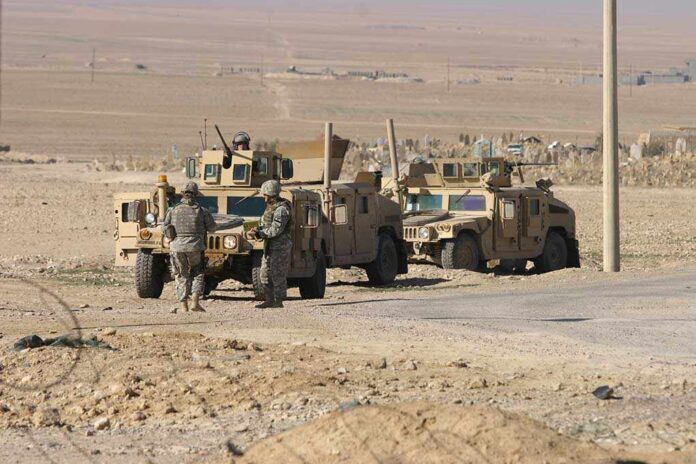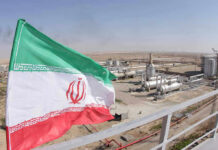
President-elect Donald Trump plans to withdraw American troops from northern Syria, according to Robert F. Kennedy Jr., sparking debate over regional security and U.S. foreign policy.
At a Glance
- Trump intends to remove U.S. troops from northern Syria to avoid potential conflict between Turkey and Kurdish forces.
- The decision stems from concerns about American soldiers being caught in crossfire.
- U.S. has supported Kurdish-led Syrian Democratic Forces (SDF) against ISIS since 2014.
- Turkey views SDF as linked to a terrorist organization, leading to tensions.
- Troop withdrawal may impact regional security and ISIS containment efforts.
Trump’s Syria Strategy Revealed by RFK Jr.
In a surprising revelation, Robert F. Kennedy Jr. has disclosed President-elect Donald Trump’s intention to withdraw American troops from northern Syria. This decision comes amid rising tensions between Turkish forces and Kurdish groups, which Trump believes could put U.S. soldiers at risk. The planned withdrawal marks a significant shift in U.S. foreign policy in the region, potentially altering the delicate balance of power in northern Syria.
Kennedy, known for his alignment with Trump, shared details of their conversation during an interview with Tucker Carlson. He highlighted Trump’s concerns about the precarious position of American forces in the region, describing the President-elect’s strategic thinking on the matter.
🚨🇺🇸RFK JR: TRUMP PUSHES TO WITHDRAW TROOPS FROM NORTHERN SYRIA
Trump aims to pull US troops from northern Syria, fearing they could become “cannon fodder” if conflict erupts between Turkey and Kurdish forces, according to ally RFK Jr. The move signals a potential shift in US… pic.twitter.com/YDT6oDObpb
— Mario Nawfal (@MarioNawfal) November 9, 2024
Complex Regional Dynamics at Play
The situation in northern Syria is complicated by the U.S. support for the Kurdish-led Syrian Democratic Forces (SDF) in their fight against ISIS since 2014. However, Turkey views the SDF and its associated YPG as extensions of the Kurdistan Workers’ Party, which it considers a terrorist organization. This has led to Turkish incursions into northern Syria, creating a volatile environment for U.S. troops stationed in the area.
“Robert F. Kennedy Jr. has revealed that President-elect Donald Trump plans to remove American troops from northern Syria rather than leaving them as ‘cannon fodder’ should conflict erupt between Turkey and Syrian Kurdish forces.” Source
Trump’s decision to withdraw troops stems from his assessment that the risk to American lives outweighs the strategic benefits of maintaining a presence in the region. The President-elect’s concern about U.S. soldiers being caught in potential crossfire between Turkish and Kurdish forces underscores the complexity of the situation.
Implications for Regional Security
The planned withdrawal raises questions about the future of regional security, particularly concerning the containment of ISIS fighters. The SDF currently governs the region of Rojava in northern Syria and detains over 10,000 ISIS fighters, including foreign nationals whose countries refuse repatriation. A U.S. troop withdrawal could potentially destabilize this arrangement, leading to concerns about a resurgence of ISIS activity.
“When I was with President Trump, we were talking about the Middle East and he took a piece of paper and he drew on it [a] map of the Middle East with all the nations on it, which most Americans couldn’t do.” Source
Despite these concerns, Trump’s decision appears to prioritize the safety of American troops over maintaining a presence in what he views as an increasingly unstable environment. This stance aligns with his previous critiques of U.S. involvement in prolonged overseas conflicts.
Congressional Reaction and Future Policy
The planned withdrawal may face opposition in Congress, as evidenced by a 2023 Senate vote to maintain the American military presence in Syria. Currently, approximately 900 U.S. soldiers support the SDF and allied rebel groups in the region. The potential policy shift under Trump’s leadership could lead to heated debates about the United States’ role in Middle Eastern conflicts and its commitments to regional allies.
“He was particularly looking at the border between Syria and Turkey, and he said, ‘We have 500 men on the border of Syria and Turkey and a little encampment that was bombed.’ He said there’s 750,000 troops in Turkey. There’s 250,000 militants in Syria. If they go up against each other, we’re in the middle.” Source
As the situation develops, all eyes will be on the incoming Trump administration to see how this policy shift unfolds and what it means for U.S. foreign policy in the Middle East. The decision to withdraw troops from northern Syria could have far-reaching consequences for regional stability and the ongoing fight against ISIS, marking a significant turning point in America’s engagement with the complex geopolitics of the region.
Sources:
- RFK Jr. says Trump wants American troops out of northern Syria
- Trump wants troops out of northern Syria, says Robert F Kennedy Jr










